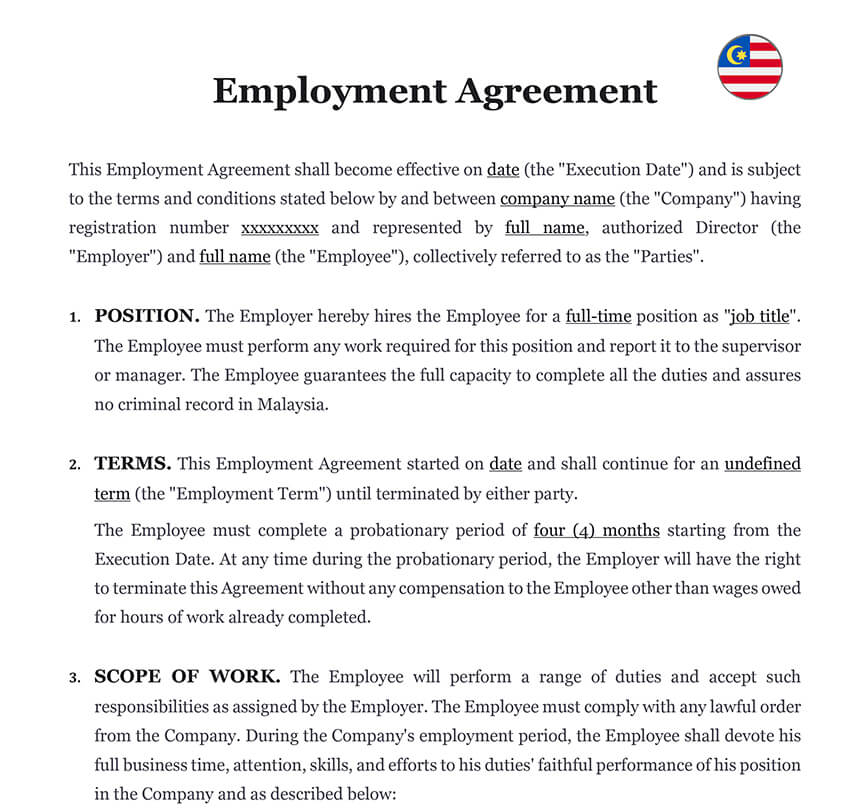Ready to use legal template
Drafted by experienced lawyers
Compliant with Hong Kong law
Ready to use legal template
Drafted by lawyers
Compliant with Hong Kong law
Learn more about Employment Contract in Hong Kong
An Employment Contract is a legally binding agreement between an employer and an employee that outlines the terms and conditions of employment. It serves to protect both parties by clearly defining rights, responsibilities, and expectations, ensuring compliance with Hong Kong’s Employment Ordinance (Cap. 57) and other relevant labor laws. A well-drafted contract helps prevent disputes, covering key aspects such as salary, working hours, termination terms, and employee benefits. In Hong Kong, having a written Employment Contract is crucial for legal clarity, especially for full-time, part-time, and fixed-term employment arrangements. To simplify the process, we offer a professionally drafted Employment Contract that is easy to edit in Word format and tailored for use in Hong Kong. Download now to ensure compliance and establish a solid foundation for employer-employee relations.
Table of contents
-
What is an Employment Contract in Hong Kong?
-
What is included in this Employment Contract?
-
What are the different types of Employment Contracts?
-
Is a written Employment Contract mandatory in Hong Kong?
-
How do probation periods work in an Employment Contract?
-
What are the legal requirements for salary payment?
-
What are the statutory benefits under an Employment Contract?
-
Is an employee entitled to severance pay in Hong Kong?
-
Are non-compete clauses enforceable in Hong Kong?
-
How can an Employment Contract be terminated in Hong Kong?
What is an Employment Contract in Hong Kong?
An Employment Contract in Hong Kong is a legally binding agreement between an employer and an employee. It outlines key employment terms such as job role, working hours, salary, and benefits. The contract also includes clauses on probation, notice periods, and termination conditions. It ensures that both parties clearly understand their rights and obligations. In Hong Kong, Employment Contracts must comply with the Employment Ordinance (Cap. 57). A written contract is highly recommended to avoid future disputes. It protects both employer and employee by providing legal clarity. The terms must be fair and transparent. This helps maintain a professional and lawful working relationship.
What is included in this Employment Contract?
A well-drafted Employment Contract typically includes several clauses to cover the scope of the employment relationship. In the context of Hong Kong law, these key clauses are:
| ➤ Position: Defines the employee’s role, responsibilities, and the expectation to perform duties according to Hong Kong labor laws. It clarifies the employee's job title and primary duties. |
| ➤ Terms: Specifies the employment duration, including any probation period, and the right to terminate employment in compliance with Hong Kong's Employment Ordinance. |
| ➤ Scope of Work: Outlines the employee’s core duties, ensuring they align with the company’s needs and directives. |
| ➤ Workplace: Identifies the primary workplace in Hong Kong, and may state that the employee can be required to work at different locations as needed. |
| ➤ Working Hours: Specifies standard working hours, overtime conditions, and rest days, ensuring compliance with labor regulations. Overtime pay must follow legal standards. |
| ➤ Salary: Outlines the employee's base salary, payment schedule (e.g., monthly or bi-weekly), and any lawful deductions. |
| ➤ Benefits: Lists statutory benefits such as commissions, bonuses, allowances, insurance, and MPF contributions as required by law. |
| ➤ Vacation: Specifies entitlements to annual leave, sick leave, and other statutory leave types under Hong Kong labor law. |
| ➤ Non-Solicitation: Prohibits the employee from soliciting clients, employees, or business partners after leaving the company. |
| ➤ Intellectual Property: Assigns ownership of inventions, designs, and other creative outputs to the employer. |
| ➤ Confidential Information: Restricts the employee from disclosing confidential company information during and after employment. |
| ➤ Termination: Details the procedures for termination, including notice periods and grounds for dismissal, in line with local labor laws. |
| ➤ Governing Law: States that the contract is governed by the laws of Hong Kong, ensuring legal enforceability. |
What are the different types of Employment Contracts?
There are various types of Employment Contracts in Hong Kong, depending on the nature of the work and the employment arrangement. These include:
| ➤ Full-time Contracts: Typically for employees working standard hours (usually 40–48 hours per week), offering benefits such as annual leave and health insurance. |
| ➤ Part-time Contracts: For employees working fewer hours than full-time staff. Part-time employees are entitled to most of the same benefits, but on a pro-rata basis. |
| ➤ Fixed-term Contracts: For a specified duration, after which the contract may either be extended or terminated. Fixed-term employees have similar rights to permanent employees, though their contract ends on the specified date. |
| ➤ Probationary Contracts: Typically used for new employees to assess their suitability for a permanent position. The terms of employment during probation may differ from the full-time contract. |
Is a written Employment Contract mandatory in Hong Kong?
1. Written Employment Contract Requirement
In Hong Kong, verbal employment agreements are legally valid but can lead to misunderstandings. A written Employment Contract is strongly recommended for clarity and protection. For jobs lasting more than four weeks with at least 18 hours per week, the Employment Ordinance requires certain terms to be clearly stated. A written contract outlines key elements such as duties, compensation, and working hours. It helps ensure both parties understand their rights and responsibilities. This reduces the risk of disputes and legal issues. A well-drafted contract also supports compliance with local labor laws. It is an essential tool for fair and transparent employment.
2. Importance of a Written Agreement
A written contract protects both the employer and the employee by clearly specifying the terms of employment, such as job responsibilities, wages, working hours, and termination procedures. This clarity is crucial to prevent misunderstandings and ensure compliance with legal requirements. Additionally, in the case of disputes or claims, the written contract can serve as an important reference document to resolve any issues efficiently. Employers and employees are encouraged to formalize their agreements in writing to protect their rights and obligations
How do probation periods work in an Employment Contract?
1. Understanding the Probation Period
A probation period in Hong Kong serves as an evaluation phase where the employer assesses the employee’s performance and suitability for the role. Typically lasting between 1 to 3 months, the duration of the probation period can be longer depending on the nature of the job. This period allows the employer to determine whether the employee meets the required standards. Both parties are usually allowed to terminate the employment with a shorter notice period, as agreed in the employment contract.
2. Terms and Conditions During Probation
The probation clause in the employment contract clearly outlines expectations regarding performance, conduct, and evaluation criteria. Employers typically use this time to assess if the employee can meet the required job performance. If the employee successfully completes the probation, they may transition to permanent employment. In contrast, failure to meet performance expectations may result in termination or further action. For more details on employment contracts, refer to the Hong Kong Labour Department.
ℹ️ The Employee Probation Period Termination clause outlines the procedures for ending employment during the probationary period, allowing both the employer and the employee to assess the suitability of the job fit.
What are the legal requirements for salary payment?
1. Salary Payment Requirements in Hong Kong
According to Hong Kong’s Employment Ordinance, employers must ensure that salary payments are made at least once a month and in full, without any unauthorized deductions. Employees should receive their wages promptly as agreed in the employment contract. To maintain transparency, employers are required to provide a payslip that outlines the employee’s total earnings, including any necessary deductions such as taxes or Mandatory Provident Fund (MPF) contributions. By adhering to these requirements, employers ensure compliance with labor regulations and reduce the risk of disputes.
2. Addressing Disputes Over Unpaid Wages
In case of any dispute regarding unpaid wages, employees have the right to file a complaint with the Hong Kong Labor Department. The Employment Ordinance protects employees by providing avenues to address such issues. Employers should ensure their employment contracts clearly define salary payment terms and obligations to avoid confusion. Proper documentation of payments and deductions is also crucial to safeguard both parties’ interests. For more information, visit the Hong Kong Labour Department.
- Remarks:
Employers must ensure that salary payments are made on time and in full according to the Employment Ordinance. Failure to comply with salary payment regulations can lead to disputes or legal action. Employers should provide accurate payslips to avoid misunderstandings and ensure transparency.
What are the statutory benefits under an Employment Contract?
Statutory benefits under Hong Kong’s Employment Ordinance include:
| ➤ Annual Leave: Employees are entitled to a minimum of 7 days of paid annual leave after completing one year of continuous service. |
| ➤ Sick Leave: Employees are entitled to paid sick leave after 4 weeks of employment, subject to a medical certificate. |
| ➤ MPF Contributions: Both employers and employees are required to contribute to the Mandatory Provident Fund (MPF) to support retirement savings. |
| ➤ Maternity and Paternity Leave: Female employees are entitled to 10 weeks of paid maternity leave, and male employees are entitled to 5 days of paid paternity leave. |
| ➤ Public Holidays: Employees are entitled to paid leave on statutory public holidays. |
Is an employee entitled to severance pay in Hong Kong?
1. Eligibility for Severance Pay
In Hong Kong, employees may be entitled to severance pay under specific circumstances such as redundancy or employer insolvency. To qualify, the employee must have been employed continuously for at least 24 months. The severance pay is calculated based on the employee’s length of service and the amount of their final wages. This provision ensures that employees who are terminated under these conditions receive fair compensation for their service. Employers should clearly define these terms in the employment contract to ensure transparency.
2. Terms to Include in the Employment Contract
It is crucial that the Employment Contract explicitly states the terms of severance pay in compliance with Hong Kong’s labor laws. This includes specifying the eligibility criteria, calculation method, and conditions under which severance pay is applicable. Having clear terms in place helps avoid disputes and ensures that both parties understand their rights and obligations. Employers should regularly review contracts to stay updated on any changes to labor laws.
Are non-compete clauses enforceable in Hong Kong?
1. Enforceability of Non-Compete Clauses in Hong Kong
Non-compete clauses are enforceable in Hong Kong, but they must meet certain criteria to be valid. The clause must be reasonable in terms of duration, geographic coverage, and the specific activities it restricts. Hong Kong courts will carefully examine whether the clause is necessary to protect legitimate business interests, such as proprietary knowledge or client relationships. If the clause imposes overly harsh restrictions on the employee, it may be deemed unenforceable. Drafting such clauses with care is essential to avoid legal complications.
2. Balancing Interests and Legal Compliance
To ensure a non-compete clause is enforceable, it must strike a balance between protecting business interests and not unduly restricting an employee’s future career opportunities. The clause should be tailored to the specific needs of the business while remaining reasonable. Employers are advised to limit the duration and geographic scope of the clause to what is strictly necessary. This ensures compliance with Hong Kong’s legal standards and increases the likelihood that the clause will be upheld in court. For further guidance on employment contracts, refer to the Hong Kong Labour Department.
ℹ️ An Employee Non-Compete Agreement ensures that an employee does not engage in certain activities that could directly compete with the employer’s business interests after leaving the company.
How can an Employment Contract be terminated in Hong Kong?
An Employment Contract in Hong Kong can be terminated by either party under certain conditions, including:
| ➤ Resignation: The employee can resign by providing the required notice period as specified in the contract. |
| ➤ Dismissal: Employers may terminate the contract for cause (e.g., misconduct, poor performance) with due process and notice, as outlined in the Employment Ordinance. |
| ➤ Mutual Agreement: Both the employer and employee may agree to end the contract at any time, subject to the terms agreed upon by both parties, including notice periods and any severance or payment obligations. |
| ➤ Termination during Probation: If the employee is still within the probation period, either party can terminate the contract with a shorter notice period, typically outlined in the contract. |
- Remarks:
Termination of an Employment Contract must comply with Hong Kong’s Employment Ordinance, ensuring that both parties follow proper procedures. Employers must adhere to statutory notice periods, severance pay, and other obligations.
Conclusion
An Employment Contract is crucial for establishing clear terms between the employer and employee, ensuring compliance with Hong Kong’s labor laws, and protecting both parties’ rights and interests. By including detailed clauses on position, salary, working hours, benefits, and termination procedures, both employers and employees can avoid potential disputes and misunderstandings. Employers in Hong Kong should ensure their contracts align with statutory requirements, such as the Employment Ordinance, and make sure employees understand their rights, including salary payment, statutory benefits, and job expectations.
SPECIAL OFFER
HR Pro
15 Document Package
Essential documents for managing employees in Hong Kong
Employment AgreementTemplate (.docx)
Save on attorney fees
310 client reviews (4.8/5) ⭐⭐⭐⭐⭐
Share information
Why Themis Partner ?
Make documents forhundreds of purposes
Hundreds of documents
Instant access to our entire library of documents for Hong Kong.
24/7 legal support
Free legal advice from our network of qualified lawyers.
Easily customized
Editable Word documents, unlimited revisions and copies.
Legal and Reliable
Documents written by lawyers that you can use with confidence.




